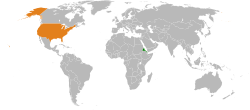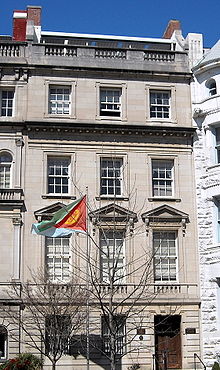| Revision as of 21:23, 8 November 2011 editGood Olfactory (talk | contribs)688,950 editsm moved Eritrea – United States relations to Eritrea–United States relations over redirect: per recent changes to WP:MOS on endash spacing issues← Previous edit | Revision as of 16:39, 9 January 2012 edit undoMystBot (talk | contribs)177,678 editsm r2.7.1) (Robot: Adding fr:Relations entre l'Érythrée et les États-UnisNext edit → | ||
| Line 36: | Line 36: | ||
| ] | ] | ||
| ] | ] | ||
| ] | |||
Revision as of 16:39, 9 January 2012
| The neutrality of this article is disputed. Relevant discussion may be found on the talk page. Please do not remove this message until conditions to do so are met. (February 2008) (Learn how and when to remove this message) |
 | |
Eritrea |
United States |
|---|---|
Eritrea-United States relations are bilateral relations between Eritrea and the United States. Joel Reifman is the current U.S. Ambassador to Eritrea.
History
The U.S. government (USG) established a consulate in Asmara in 1942. In 1953, the USG signed a Mutual Defense Treaty with Ethiopia. The treaty granted the United States control and expansion of the important British military communications base at Kagnew near Asmara. In the 1960s, as many as 1,700 U.S. military personnel were stationed at Kagnew. In the 1970s, technological advances in the satellite and communications fields were making the communications station at Kagnew increasingly obsolete.

In 1974, Kagnew Station drastically reduced its personnel complement. In early 1977, the United States informed the Ethiopian government that it intended to close Kagnew Station permanently by September 30, 1977. In the meantime, U.S. relations with the Mengistu regime worsened. In April 1977, Mengistu abrogated the 1953 mutual defense treaty and ordered a reduction of U.S. personnel in Ethiopia, including the closure of Kagnew Communications Center and the consulate in Asmara. In August 1992, the United States reopened its consulate in Asmara, staffed with one officer. On April 27, 1993, the United States recognized Eritrea as an independent state, and on June 11, diplomatic relations were established with the appointment of a chargé d'affaires. The first U.S. Ambassador arrived later that year.
The United States has provided substantial assistance to Eritrea, including food and development aid. In 2004, the United States provided over $65 million in humanitarian aid to Eritrea, including $58.1 million in food assistance and $3.47 million to support refugees. In 2005, the Eritrean government told USAID to cease operations. USAID complied.
U.S. interests in Eritrea include consolidating the peace with Ethiopia, encouraging progress toward establishing a democratic political culture, supporting Eritrean efforts to become constructively involved in solving regional problems, assisting Eritrea in dealing with its humanitarian and development needs, and promoting economic reform.
The U.S. Embassy is in Asmara. Jennifer McIntyre is the Deputy Chief of Mission. Brian Shelbourn is the Consular Officer. Matthew Smith is the Management Officer. The Public Affairs Officer is Margery Benson. The Political/Military Officer and Defense Attache positions are vacant.
Relations between the two nations met notable strain in 2009, when U.S. intelligence implicated that Eritrea has actively supported Muslim terrorist groups such as al-Shabaab in war-torn Somalia, where they have beaten back the UN-backed Transitional Federal Government in the south and conquered most of Mogadishu, the nation's capital. During her African tour in August 2009, U.S. Secretary of State Hillary Clinton accused Eritrea of supporting al-Shabaab and has threatened to "take action" against Eritrea if it does not cease its alleged support for the rebels, while also voicing her nation's support for the legitimate government. Eritrea denies these claims.
See also
References
![]() This article incorporates public domain material from U.S. Bilateral Relations Fact Sheets. United States Department of State.
This article incorporates public domain material from U.S. Bilateral Relations Fact Sheets. United States Department of State.
External links
Categories: